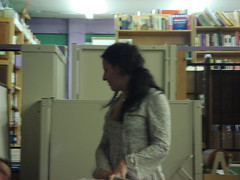So after reading and hearing so much about "communities" on blogs and in situ, I've been wondering about this question too. Not so much what constitutes a poetic community, rather when some poets started privileging the community over, what? Individual authorship? Of course, it all goes back to my recent visit to the Bay Area, where everyone seems to know everyone regardless of professional status. On my first night there, Johnny Sakkis would introduce me to Kevin Killian, Brent Cunningham, Bill Luoma at the Artefact Reading Series (a house reading, something apparently quite popular in the Bay Area) and I would bump into Juliana Spahr, seeing her again in the rows of the auditorium for Poet's Theatre, meeting Clayton Banes and Kaya Oakes the next day at Pegasus Downtown for the Sandy Florian/Arielle Greenberg reading, the latter introducing me to a Kerri (Sonnenberg?), then being introduced to even more people on Friday during Poet's Theatre.
In contrast, Houston is a more insular place. I've discussed this with Michael Koshkin and Jen Rogers when they were in town, Houston doesn't seem as interested in its people, unless they are wealthy and famous and/or have earned many many awards. The poets here do their MFAs or their PhDs, then leave, never to be heard again, unless you are looking at the pages of Poets & Writers, in which case, you'll see the university bragging about such and such poet/writer being educated there (as well as Brazos Bookstore, with its aisle dedicated to "Poets from the University of Houston").
Of course, Houston is a more conservative place (both poetically and politically). But I'm more interested in the "when?" Because we can trace the idea of the "poet as individual genius" back to the Romantics, if not the Renaissance, when a bunch of Italian craftsmen decided to call themselves "artists" and when those painters became the rock stars of their day. When did we start talking about "community" in regards to poetry? In the 1970s when people started being interested in the New York School? With the Lower East Side poetry scene? The Language poets? When some form of "third way poetics," mixing confessional narrative and "experimental disjunction," (think Olena Kalytiak Davis) started emerging in the 1990s? If the latter, is this discourse of community a way to exclude them into what Silliman calls "School of Quietude," because those poets don't quite belong to overt communities?

Comments
The current idea of community probably owes a whole lot to the 1950s/1960s scenes in San Fran and NYC - Beats and Berrigans etc.
http://www.dusie.org/hunter.html
She's great.
Though I live in the bay area, and have for, oh, my entire freaking life, I don't feel like a part of a poetry community. I did a little during my MFA, but I like mixing with people working outside of poetry -- musicians, visual artists, and so on. Plus, I keep to myself quite a lot. This, I think, lets me keep working but helps me avoid the insularity mentioned above. I like having friends who write poetry, but I'd feel odd if everyone I knew was a poet. It'd be like being in a clone world.
Kaya: I feel the same way. I like hanging out with artists more than with poets. Matt Siegel and I were actually talking about it last night.
I went to U of H as an undergrad and remember Cynthia Macdonald causing people to run out of class crying. Not really a good way to allow for community to develop...
I think Houston hates poets and they internalize that hate, and take it out on each other. It was much more supportive at New College, where I went to grad school, usually. Well sometimes not. But the overall vibe was much more supportive...